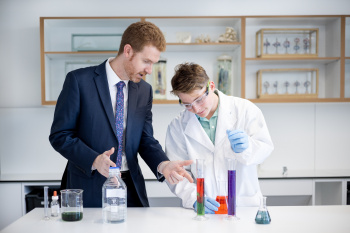
South Australian Science Teachers Association
Celebrating Our Science Leaders
Posted by SASTA
on 29/07/2024

We wanted to highlight some of our science leaders and share their inspiring journeys. Read on to find out more!
Jason Greenslade, Science Curriculum Leader, Westminster School
What inspired you to become a science teacher?
I love working with people, I also love seeing people grow and get better – this career was a natural option for me in that regard. Why Science? Likely because I was good at it at school and I love understanding how the world around me works. For me, teaching and education is about producing lovely people who know how to navigate their way in the world, if they get great results then that is a bonus!
Can you tell us about any accomplishments or any programs currently running in your school?
I am the curriculum leader for Science and Agriculture at my site and I am so proud of how much my team gives back to the SA Science teaching community, we run PL through SASTA throughout the year both at school and externally, help curate conferences for early and pre-service teachers, support science leaders to become more effective, share resources widely and work incredibly collaboratively. Westminster continues to develop student agency tasks in science, work on active differentiation and support several of our staff aiming for certification at the Highly Effective career stage.
What advice would you give to fellow teachers who want to become science leaders?
Leadership is a privilege – it is the opportunity to help create a work environment in which teachers love their job and coming to work – which in turn makes for the best outcomes for students. It is incredibly tough at times but also incredibly rewarding – know that if you ever need support – there are a range of people who will help you both in your own school and externally. If you find yourself going “I think we could do that better” then maybe it is time you put your hat in the ring and give it a go!
Alexia Little, Science Curriculum Leader, Cardijn College
What inspired you to become a science teacher?
I studied Biology for the first time in Year 12, and had the most brilliant teacher ever – Mr. Gibson! He just radiated passion for his subject in a way that I had not experienced before. I quickly developed a love of Biology, and after completing a Science degree at Flinders University, I enrolled in postgraduate secondary teaching, hoping it was the right choice for me. On the very first day of my first placement, I knew this was where I was meant to be. Fast forward 16 years, and I am the Science Curriculum leader at Cardijn College, teaching science with a passion, and loving every minute of it!
Can you tell us about any accomplishments or any programs currently running in your school?
In Term 3, our year 10 students all engage in the Future Anything: Activate program, which we deliver as part of our science curriculum. Students are asked to ideate problems that they are passionate about, and then through a science lens, pitch an innovative, sustainable, and scalable solution that makes the world a better place. I trialled the program with my class in 2020, and then led the roll out to the entire cohort the following year. Each year we are blown away by the creativity and passion our students show in developing their solutions. Their work culminates in a market-style Showcase, and a Shark Tank pitching event with guest judges from outside the College. Each year, Cardijn teams have featured in the National Semi-Finals and last year we had a team successfully share their idea as part of the National Grand Final showcase. The exciting thing about this program is that we get to see the students excel in a completely different way. We are about to embark on the program for our 5th year, and can’t wait to see what amazing ideas the students come up with.
What advice would you give to fellow teachers who want to become science leaders?
While you can’t be a science leader without a love of science, being a leader is so much more than that. You need to be comfortable being uncomfortable. Challenge yourself – learn from people that you think are amazing leaders. Reflect on the leaders you’ve had in your life and the leaders around you – note the things you want to emulate and the things you want to avoid. You need to care about your team and their wellbeing. You are their voice in times of need, and you can believe in them and lead them to see their potential when they cannot. Be clear on your values and stand by them. You need to know what is important to you, to your faculty and to your students and their families. Value your staff and let them know you see them and appreciate them. And finally, don’t sweat the small stuff. There will always be a million balls in the air - prioritise which ones you won’t let hit the ground.
Archive
- February 2026
- January 2026
- December 2025
- November 2025
- October 2025
- September 2025
- August 2025
- July 2025
- June 2025
- May 2025
- April 2025
- March 2025
- February 2025
- January 2025
- December 2024
- November 2024
- October 2024
- September 2024
- August 2024
- July 2024
- June 2024
- May 2024
- April 2024
- March 2024
- February 2024
- December 2023
- November 2023
- October 2023
- September 2023
- July 2023
- June 2023
- May 2023
- April 2023
- March 2023
- February 2023
- January 2023
- December 2022
- November 2022
- October 2022
- August 2022
- July 2022
- June 2022
- May 2022
- April 2022
- March 2022
- February 2022
- January 2022
- December 2021
- November 2021
- October 2021
- September 2021
- August 2021
- July 2021
- June 2021
- May 2021
- April 2021
- March 2021
- February 2021
- January 2021
- December 2020
- November 2020
- October 2020
- September 2020
- August 2020
- July 2020
- June 2020
- May 2020
- April 2020
- October 2018
- September 2018
- August 2018
- July 2018

